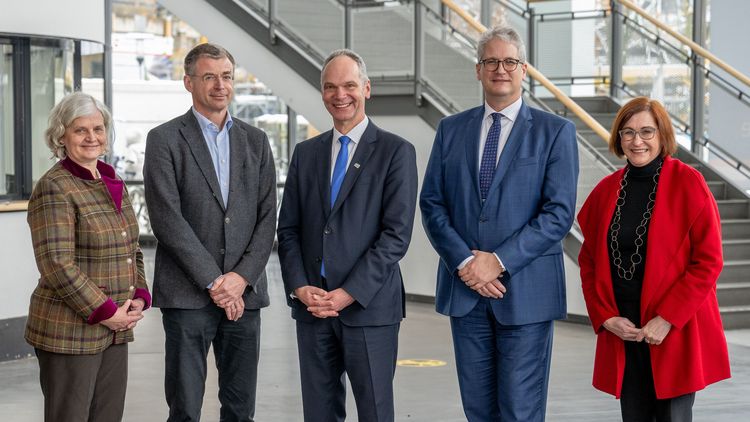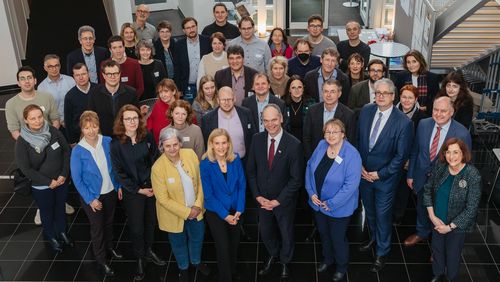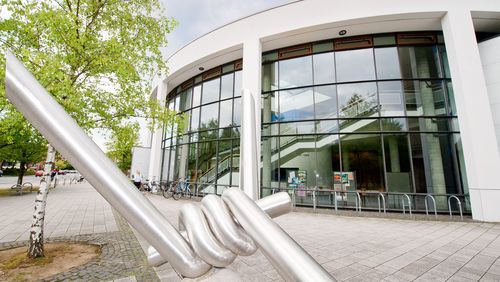Katharina Al-Shamery, Andrea Strübind and Ralf Grüttemeier are to join the University's Presidential Board in January. Following their confirmation by the Senate, the three outlined their priorities as future Vice-Presidents.
Three new members will join the University of Oldenburg’s five-member Presidential Board at the beginning of next year. Following a proposal by University President Prof. Dr Ralph Bruder, the University Senate confirmed literary scholar Prof. Dr Ralf Grüttemeier as the new Vice President for Research and Transfer, theologian Prof. Dr Andrea Strübind as Vice President for Instruction and chemist Prof. Dr Katharina Al-Shamery as the future Vice President for Academic Career Paths, Equal Opportunities and International Affairs. The Senate’s vote, together with the opinion of the University Council, will now be submitted to the Lower Saxony Ministry of Science and Culture (MWK) for final decision. The two-year term of the three members of the Presidential Board who perform the function on a part-time basis is to begin on 1 January 2024, while the eight-year term of the full-time Vice President for Administration and Finance, Jörg Stahlmann, runs until the end of 2027.
University President Ralph Bruder said he was looking forward to welcoming three experienced colleagues with a proven track record in research and teaching as Vice Presidents, adding that together with Vice President for Administration and Finance Jörg Stahlmann the new Presidential Board would continue to vigorously promote the university’s development and act in line with its motto “Open to New Approaches”. The term of office of the current Presidential Board lasts until the end of the year. Bruder thanked the three outgoing members of the Presidential Board, Prof. Dr Christiane Thiel, Prof. Dr Karsten Speck and Prof. Dr Annett Thiele, for their “utmost commitment to the welfare of the university”.
In his speech to the Senate, Grüttemeier, future Vice President for Research and Transfer, said greater visibility for the humanities and social sciences was one of his top priorities. Oldenburg had a lot to offer, from successful and well-structured doctoral programmes to the long-term historical Prize Papers Project funded by the German Academies Programme. He added that he intends to do all he can to “increase the presence of Oldenburg’s outstanding individual and collaborative research in academic and social debates”, and to further develop the dialogue between the humanities and the natural sciences. Especially in these times of manifold transformation processes – in areas such as energy, mobility or education – it was “increasingly important for researchers from the natural sciences and humanities to examine key issues together”, Grüttemeier stressed. To promote this interdisciplinary dialogue and ensure that it can take place even more frequently and advance the university as a whole, he is also looking at the possibility of introducing new formats, he explained.
Addressing the Senate, Strübind pointed to the pioneering character of the university when it was founded 50 years ago, noting that this forward-looking approach is still apparent today, not least in its culture of research-based learning. “Practice-oriented approaches and commitment to critically accompanying social processes remain relevant perspectives," she emphasised. “Especially after the pandemic, it would do us good to rediscover the university as a place of intellectual exchange and shared learning, as an academic space for joint research and communication, and to keep fighting for this academic culture.” She described digitalisation and sensible use of artificial intelligence as major challenges for education. The future Vice President for Instruction called for a holistic view of the university's educational mission which includes a focus on students’ personal development in terms of critical and analytical thinking and nuanced reasoning, as well as optimal training of their mediation skills.
In her address, Al-Shamery also stressed the societal role of the university in educating the decision-makers of tomorrow and preparing them for the rapid changes in today's globally networked, knowledge-based world. “Educating academical talents is especially important, because they will play a decisive role in shaping the future,” she explained, adding that this stands in contradiction to the often precarious working conditions in the academic system. “There is a shortage of the crucial mid-level positions that make reliable career planning possible in academia,” Al-Shamery observed. A way must be found to create an appreciative, socially secure environment in which creative minds can give free rein to their ideas, and at the same time provide clear career pathways. She noted that international networks are also particularly important for promoting academic talent. The university's internationalisation strategy must therefore be developed further and both existing and new concepts for promoting diversity and equality anchored even more firmly, she explained.




